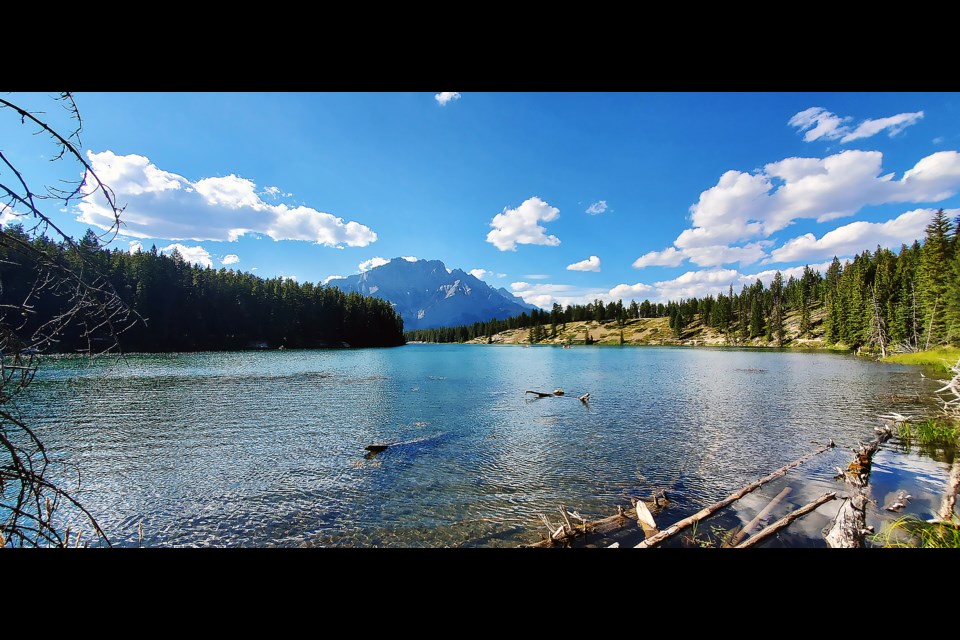BANFF NATIONAL PARK – Fourteen people are facing a combined 28 charges for camping illegally and engaging in unlawful activities at Banff National Park’s Johnson Lake over the August long weekend.
On Aug. 7, Parks Canada law enforcement was called to respond to the lake’s beach area where there was evidence the large group was camped.
“Wildlife attractants had been left out, and there was evidence of public alcohol consumption and an illegal fire,” said Natalie Fay, Banff field unit external relations manager, in an email. “Human waste was also found in the immediate area.”
Parks Canada wardens and Banff RCMP collaborated on the response that morning and two charges are pending per individual under the Canada National Parks Act. Offenders will receive court dates, with the maximum fine per count being $25,000.
Banff RCMP Sgt. Mike Buxton-Carr said due to the size of the group, officers were called to assist Parks wardens in identifying people and enforcing the Parks Act.
While assisting, officers found one of the campers had an outstanding warrant for arrest.
“We executed that warrant and that was it. No new charges arose from RCMP,” said Buxton-Carr, adding the name of the person would not be released as local RCMP did not hold the warrant.
Camping within Banff National Park is restricted to designated campgrounds and campfires to designated fire rings, such as at a campground or day-use area. Leaving wildlife attractants, such as food or trash unattended, is also strictly prohibited by law.
Bow Valley Naturalists president Peter Duck said while camping illegally in the national park and throughout the Bow Valley is nothing new, this instance was an “egregious” example.
“It requires a firm response. There’s a range of reasons why this kind of activity is inappropriate,” said Duck. “There’s wildlife and other environmental concerns, there’s public safety concerns in terms of being able to manage both negative wildlife interactions and fire, and there’s also the need to protect experience of other visitors to the park.”
Duck said he’s glad Parks Canada took a hard stance on the violations but also wonders what more can be learned from the incident as more people visit Banff National Park, which sees about four million visitors annually.
“As campgrounds throughout the region become full, there’s going to be more and more of this kind of pressure for people who can’t find a campsite elsewhere and undertake in this kind of behaviour,” he said.
“Maybe there’s something we can learn from it in terms of managing these kinds of cases.”
Parks Canada has not confirmed whether the group was asked if they tried to camp elsewhere unsuccessfully or if they knew they were camped illegally. It’s also not clear how long they were camped at the lake before being reported. The Outlook has reached out to the agency for more information.
Duck said he hopes the charges send a message as more people come in close proximity to wildlife.
“With more and more growth of human activity and human use and mobility, incidents like this need to be managed,” he said. “We don’t want habituation of wildlife.”
Each year, Parks officials discover hundreds of illegal campsites across Banff National Park. In 2018, two people, including a former Bow Valley resident, were ordered to pay $400 each after they were found illegally camping at Rockbound Lake near Castle Mountain.
In 2016, the Banff field unit responded to 53 illegal camping incidents in the national park, resulting in 42 charges. That almost doubled to 96 cases, which ended in 44 charges being laid, in 2017.
Unlawful camping can harm the environment, lead to littering, attract wildlife and cause other negative consequences, said Fay.
“Park wardens may issue a warning, but wherever warranted we will charge or evict visitors [in violation],” she said. “In most cases, if food or garbage is left accessible to wildlife, it will be secured by park staff or seized as evidence by wardens and visitors may be charged for wildlife attractants.”
National parks are critical to safeguard natural habitats for wildlife and offer people opportunities to connect with nature, said Fay, adding Parks Canada thanks those who reported the violations at Johnson Lake.
“Like all natural landscapes and complex ecosystems, these places are vulnerable to damage from human use,” she said. “Parks Canada’s campsite infrastructure, including tent sites, washrooms, firepits and secure food lockers, provide visitors with a high-quality camping experience while protecting these special places – and the wildlife that call them home – for generations to come.”
If you see illegal activity in Banff, Yoho or Kootenay National Parks, report it to park wardens immediately by sending an email to [email protected] or call Banff Park Dispatch at 403-762-1470.
The Local Journalism Initiative is funded by the Government of Canada. The position covers Îyârhe (Stoney) Nakoda First Nation and Kananaskis Country.




